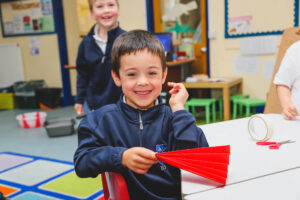I’m sure that we have all been there: heard that three-letter word that can create so many problems, or lead you down a rabbit hole of explanations. That word being ‘Why?’
Children say ‘why’ all the time.
“Please go to bed.”
“Why?”
Or,
“Why is the sky blue when space is so dark?”
Sometimes as educators, parents or adults, we shut these questions down. This may be because we have run out of patience to the constant questioning or – more likely in my case – because we have no idea why a snail can sleep for up to three years at a time, or why all the blood doesn’t rush to the heads of people living in New Zealand.
But isn’t it great that children feel comfortable enough to ask the question, and intrigued enough to want to know why things happen, or why things are as they are? Asking ‘why?’ is a sign of curiosity, a wanting to understand the world that we live in. This inquisitive spirit helps children develop a thirst for knowledge, a passion for a certain topic, and an understanding of how things work!
As adults, we tend to stop asking these questions; maybe we stop being so curious about the world around us, or maybe our drive for new information and knowledge decreases as our age increases. When we do ask a question, it tends to be about things out of our control. ‘Why did England bring on two new players to take penalties in the EURO 2020 final?’, or ‘Why do leaves on a track mean I’m now late for work?’
But the way in which we respond to those ‘why’ questions is crucial in a child’s development.
Sometimes we are able to provide children with an answer; sometimes they have a follow-up question; sometimes we provide a response that surprises or confuses them; sometimes we try to bluff our way out of an answer; and sometimes we have to admit to a child that actually, we don’t know why things are the way they are.
However, we must also ask ourselves – are we actually helping the child’s development by immediately answering their question? Should we actually be encouraging children to think freely and independently, to go through the thought process and conduct their own research? Perhaps we should be guiding them towards the answer they are looking for, providing them with the skills to search for information and discover reputable sources. Or maybe we should be providing a balance between all three.
In the new PSHE curriculum, we try to provide children with a safe space to ask questions and to learn about new, interesting and complex ideas and values. We encourage them to talk about how they feel, about why they may feel that way, and that there is no right or wrong way to feel. We want children to ask us why: why do I need to learn about the value of money? Why is it important to treat people fairly and with respect? Why should we keep ourselves fit and healthy? But most importantly we want to encourage children to try and think of an answer independently, and share their thoughts in a place where they feel comfortable to express themselves.
So, the next time I hear that three-letter word uttered in my direction, I plan to encourage children to think independently before I add my thoughts and ideas, and say, ‘well, why do you think?’
Mr James Kelly
Head of PSHE and RSE
Year 3 Form Tutor







